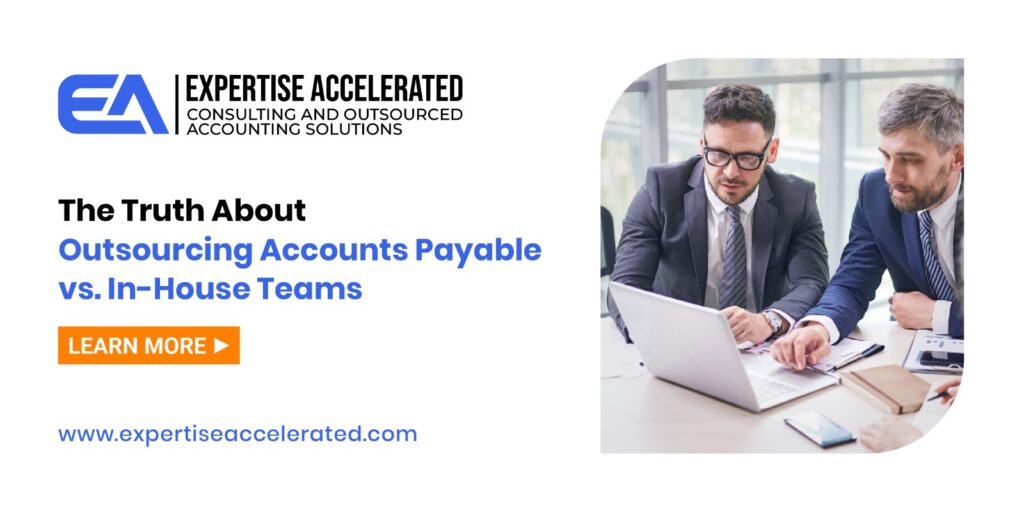Choosing outsourcing or in-house accounting is key. It impacts costs, efficiency, and growth, with pros and cons based on your needs.
Handling accounts payable (AP) internally can be costly and prolonged. As your business grows, staying organized gets harder without more staff. That’s why many companies outsource AP to save time and resources.
Outsourcing means hiring accountants from other countries, often at lower costs. Some owners worry about trust and communication with remote teams. Big companies like Google and Meta started small. Their smart ideas helped, but getting work done and growing wasn’t easy. Outsourcing played a big part in helping them grow and keep running smoothly.
This blog explains outsourcing AP, its pros and cons, and when AP software is better.
We’ll help you choose in-house or outsourced accounting in a simple and clear way.
Understanding Accounts Payable Outsourcing
AP outsourcing means hiring another company to manage invoices and payments. Instead of doing AP yourself, experts handle it with smart tools to save you time and effort.
Accounts payable is money you owe suppliers for goods or services received but not yet paid. Managing it well is important for cash flow.
A good outsourcing partner improves your AP process but doesn’t take it over. Outsourcing isn’t ideal for all; some may prefer in-house AP software for better data control.
Why Do Businesses Look for AP Support?
Businesses often struggle with AP due to tracking, vendor, and cost challenges. Using paper and spreadsheets makes it tough to see where money goes, find mistakes, or plan for the future. Outsourcing AP means experts handle these tasks and give better financial reports. But if you want full control and instant updates, using AP automation software might be best. Another problem is paying vendors on time. When AP is messy, payments get late, which causes problems with vendors. Outsourcing helps make sure payments are on time. Automation tools can also reduce mistakes and manage regular payments and missing bills. Manual invoices cost around $22 each. Outsourcing or automation cuts costs and boosts efficiency.
AP Outsourcing vs. AP Automation
Accounts Payable Outsourcing
Outsourcing means hiring an external company to manage your AP tasks. These providers often use their own AP automation tools.
Before choosing a provider, consider the following:
- Are they reliable and secure?
- Will they pay invoices on time?
- Can they help improve your cash flow?
- Do they offer good customer service?
Accounts Payable Automation Software
This is a digital tool that integrates with your accounting system or ERP. You manage everything in-house, but the software does most of the heavy lifting.
With AP software, you can:
- Onboard vendors through a self-service portal
- Automatically capture and match invoices
- Detect duplicate or fraudulent invoices
- Automate approval workflows
- Make domestic and international payments
- Get real-time reports and insights
Difference Between In-House and Outsourced Accounting
In-House Accounting Your own employees do the work like bookkeeping, payroll, and taxes in your office.
Outsourced Accounting You hire outside experts to do the same work from another location.
Why Businesses Choose to Outsource Accounting
You can save up to 70% by hiring experts instead of full-time staff and office costs. Th
ese experts manage audits , taxes, and reports using the latest tools.
Outsourcing also gives you flexibility. You can get extra help during busy times without hiring more staff. This lets you and your team focus on growing the business. Plus, outsourcing teams understand local tax laws, helping you avoid costly mistakes or penalties.
Why Businesses Keep Accounting In-House
In-house accountants give you control over how work is done to fit your needs. It’s easier to talk to them and fix problems fast because they are right there. They know your business well, so they can make plans that match your goals. Your financial data is safer because it stays inside your company. An in-house team works better together and knows your business well. If something goes wrong, your accountants can fix it quickly without waiting.
In-house accounting can be expensive because you pay for salaries, benefits, and training. Your team might not know everything needed for every task. Managing staff takes time and effort. It’s hard to add or remove people when your needs change. You also have to pay for and keep accounting software up to date. If someone leaves, finding a new worker can cost time and money.
Which Is Better In-house or Outsource Accounting?
Here are a few questions to help you decide:
What tasks do you need help with?
How often do you need to do these tasks?
Do you need a specialist or basic bookkeeping?
Are you trying to save costs?
Do you want to focus more on your main business activities?
Are you planning to grow quickly?
If you need flexibility, cost savings, and access to experts, outsourcing might be best. If you want control and easy communication, in-house accounting is better.
Case study
Outsourcing accounts payable can help your business save time and money. But with so many providers out there, it’s hard to know who to trust. That’s why many businesses choose Expertise Accelerated (EA). We help companies cut costs by up to 60% and improve how their AP works. Our U.S.-based managers ensure smooth communication and deep industry experience.
One client, a U.S.-based CPG business, had trouble with late payments, vendor issues, and delays in production. EA stepped in and fixed the problems. We ensured on-time payments and kept vendors updated. This helped the company avoid delays and build better vendor relationships. We also cleaned up messy email systems, fixed invoice backlogs, and made reports more accurate. Our team set up clear processes, organized tasks, and made everything easier to manage.
Now, that company has a smoother AP system, better cash flow, and stronger vendor trust. If your business is facing similar problems, EA can help.
Final Thoughts
There’s no single right choice. It depends on your budget, business size, and goals. Outsourcing is a smart option if you want to reduce costs, access top talent, and scale fast. In-house accounting works better if you need hands-on control and close communication.
If you’re looking to save money and hire skilled accountants EA can help. We make it easy to build a high-quality remote accounting team.
This blog finishes our talk about in-house versus outsourced accounting. Both have good points and some challenges. The important thing is to pick the right people to handle your accounting. We hope this helps you pick the best accounting option for your business.
Ready to explore outsourcing? Book a free consultation call with Expertise Accelerated today.




